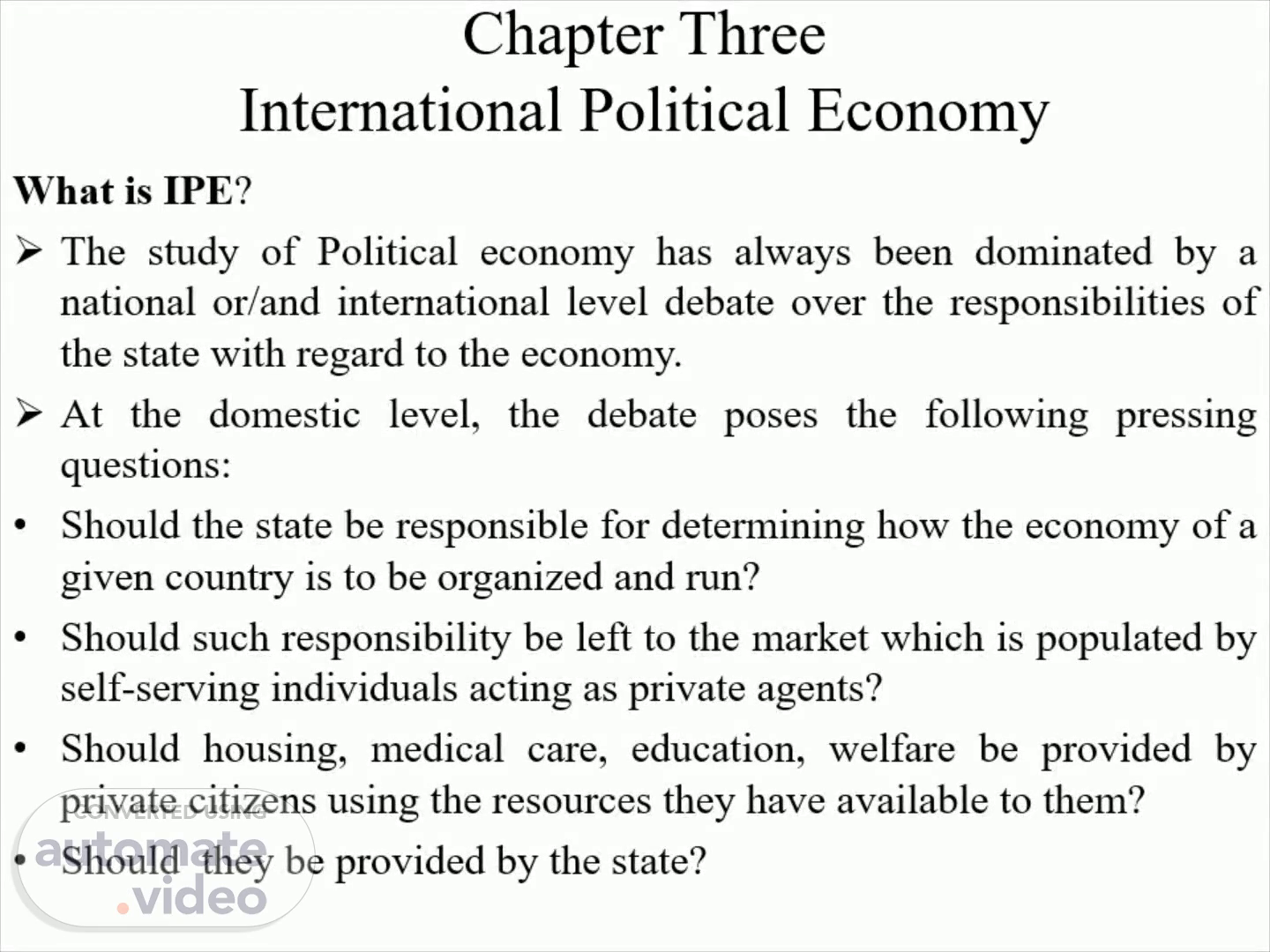
Page 1 (0s)
Chapter Three International Political Economy. What is IPE ? The study of Political economy has always been dominated by a national or/and international level debate over the responsibilities of the state with regard to the economy. At the domestic level, the debate poses the following pressing questions: Should the state be responsible for determining how the economy of a given country is to be organized and run? S hould such responsibility be left to the market which is populated by self-serving individuals acting as private agents? Should housing, medical care, education, welfare be provided by private citizens using the resources they have available to them? Should they be provided by the state?.
Page 2 (29s)
Cont …. At the international level of analysis, the debate also poses such pressing questions as: How should international trade be governed? How should international investment be governed? How should international finance be governed? W hat should/not be the role of international institutions like the IMF, WB and WTO in the governance of international finance, investment and trade? Political economy is the study of the intersection between politics and economics within a given country IPE is a field of inquiry that studies the ever-changing relationship between governments, businesses, and social forces across history and in different geographical areas IPE is concerned with the way in which political and economic factors interact at the global level.
Page 3 (58s)
Cont …. IPE is a field that thrives on the process that Joseph Schumpeter called “creative destruction”. The growing prominence of IPE as a field of study is a result of the continuing breakdown of disciplinary boundaries between economics and politics in particular and among social sciences generally The traditional IPE problematique includes analysis of the political economy of international trade, international finance, north-south relations, multinational corporations, and hegemony The emerging IPE (New IPE) subjects include international development, regional cooperation and integration, environmental problems, and globalization and its consequences. Theoretical perspectives on IPE Theories are developed to answer the following questions How exactly does politics shape the decisions that societies make about how to use the resources that are available to them? What are the consequences of these decisions ?.
Page 4 (1m 31s)
Mercantilism. The 16 th and 17 th centuries economic policies of the great powers and the overall economic systems are often referred to by the term mercantilism international economic relations were carried out within the context of imperialism. Mercantilists advocated self-serving states favouring exports, so that wealth could be accumulated Basic tenets include: The government should involve in international trade for the purpose of protecting the interest of the state and their citizens. Mercantalists fear that unregulated economy leads to anarchy and exploitation as greed individual enrich themselves disregarding others. International economics is competitive not cooperative. They reject the notion of comparative advantage due to their more pessimistic assessment on human nature and the behavior of governments Self-sufficiency _ they advocate governments holding what they have and trying to reduce rely on other states..
Page 5 (2m 5s)
Protectionism _ they advise governments to employ a variety of economic policies to insulate their domestic industries from foreign competition. E.g : tariff, quota, red tape, export subsidies etc classical mercantilism was based on 3 central propositions. These are: National power and wealth are tightly connected Trade provides countries one way to acquire wealth from abroad if a positive balance of trade. Some economic activities are more valuable than others. e.g Manufacturing activity should be promoted, whereas agriculture and other non-manufacturing activities should be discouraged Modern mercantilism applies these three propositions to contemporary international economic policy in the following propositions. Economic strength is a critical component of national power Trade is to be valued for exports, but government should discourage imports whenever possible Some forms of economic activities are more valuable than others Mercantilism, in general, argued that state should play a large role in determining how society’s resources are allocated..
Page 6 (2m 44s)
Liberalism. Emerged in the 18 th century Challenged all the propositions of mercantilism: The purpose of economic activity is to enrich individuals, not to enhance state power Countries do not enrich themselves by running trade surpluses Countries are not necessarily made wealthier by producing manufactured goods, but by producing products at a relatively low cost at home . The central propositions of liberalism include: Free trade_ minimization of gov’t involvement in international trade Invisible hand_ society would be better off without government interference Comparative advantage_ If a country/individual is relatively more efficient in the production of a good than another country/individual Trade brings peace_ economic interdependence brings international peace.
Page 7 (3m 12s)
Marxism. Capital is concentrated in the hand of capitalists The capitalists control the state LDCs are exploited by the capitalist state The best example is the colonial structure Global economy does not provide benefit to all countries i.e all gains accrue to the capitalist countries Global economy is a zero-sum game NB : each perspective have different response to the questions: How politics shape the allocation of resources? Mercantilist: state guides resource allocations Liberalist: politics play little role Marxist: decision are made by large capitalist class What are the consequences of resource allocation? Mercantilist: to enhance state power Liberalist: to improve the welfare of the people Marxist: to concentrate wealth in the hands of capitalists.
Page 8 (3m 42s)
Thank you!!!.